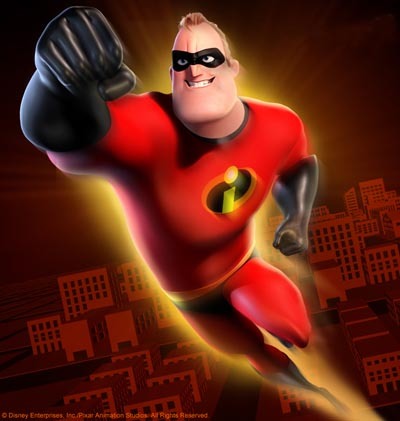BitDepth 454 - January 04
11/01/09 17:42 Filed in: BitDepth - January 2005
Animation goes 3D even as the stories drift into unreality.
The sheen of the nearly real

Pixar's The Incredibles
Today's animated films bring together two of my favourite things; witty adventure comedies and extreme technology. The digital effigies that populate recent films like Shark Tale, Shrek 2, Polar Express and The Incredibles begin life as wireframe drawings on a computer, their expressions and movement given the spark of life by millions of tiny polygons joined in a fine mesh that brings an exoskeleton of shape to these characters and their environment.
Grafted onto that mesh are the "skins", the codifications of character, clothing, hair, flesh and the fine tuning of expressions that with anthropomorphic wizardry evolve these digital objects from bits into people.
They may come in a variety of shapes, sizes and colours, but voiced by famous and near-famous actors, there's no question that these byte-based simulacra are intended to be more familiar than alien, curiosities that are both intriguing and soothingly familiar, whether they are talking toys or fuzzy monsters in search of a good scare.
Remaining at the top of an increasingly busy marketplace for films featuring humanised fish, toys, and bugs is Pixar, the 800lb gorilla of three-dimensional animation. With a facility for stylish, absorbing films spun out of whole pixels that's matched by an insistence on robust stories, Pixar has managed something that studios with the budgets for expensive actors haven't been able to pull off, an unbroken string of hits beginning with the endearing Toy Story (1995).
The studio's latest film, The Incredibles, raises the bar for their animation prowess since it's the first one that has humans, well superhumans if you want to be exact, as its lead characters.
After toys, bugs, monsters and fish, Pixar felt ready to tackle the most difficult animation challenge of all, virtual flesh and blood. To understand why, you have to look more closely at Pixar's earlier films, in which people were largely represented by huge disembodied feet and hands, like pink Kongs, more looming presence than personality.
Or you could look at Polar Express, an animated film that seems to consist almost entirely of variations of Tom Hanks, which depends, to its detriment, on digital representations of human expression. The stunning train and remarkable scenes in Polar Express contrast badly with the children and adult characters, who seem botoxed into submission, their faces still and contemplative to a degree that's unsettling.
The disconnect between what's being said and what we're seeing on their faces is so vast that it makes the travellers on the fanciful train seem like zombies too sedated to ask for a serving of brains.
The reason is found in what game animators call the "uncanny valley", the subtle gap between animated characters that seem human and those that try to pass for human.
The Incredibles succeeds because it's more Fred Flinstone than Aki Ross (of the ill-fated Final Fantasy) in its animation style. The superhuman family dashes around with the flexibility of the Roadrunner and the Acme-armed coyote, all stretchy limbs and exaggerated expressions. But even that explanation gives short shrift to what Brad Bird has done with his tale of a superhero family on the downlow.
Polar Express is exactly what it sounds like. A trip to the North Pole that conveys a skeptical child to the wonder of Christmas. The Incredibles is far more subtle than its advertising and promotional clips make it out to be. Brad Bird's film is a story about a cloistered family of superheroes, but it's also an amusing but chilling rumination on the power of mediocrity.
I've heard quite a few supervillian threats, including Goldfinger's standout exchange with James Bond, but nothing seemed quite as scary as Syndrome's snarling "...and when everyone is super, no-one will be."
A lot more films these days wear the trappings of a Pixar film. Modern technology drives many more animated creatures through their paces these days, but Pixar keeps delivering solid, thoughtful stories that keep moving the punters through the turnstiles. And really, that's the most incredible thing of all.

Pixar's The Incredibles
Today's animated films bring together two of my favourite things; witty adventure comedies and extreme technology. The digital effigies that populate recent films like Shark Tale, Shrek 2, Polar Express and The Incredibles begin life as wireframe drawings on a computer, their expressions and movement given the spark of life by millions of tiny polygons joined in a fine mesh that brings an exoskeleton of shape to these characters and their environment.
Grafted onto that mesh are the "skins", the codifications of character, clothing, hair, flesh and the fine tuning of expressions that with anthropomorphic wizardry evolve these digital objects from bits into people.
They may come in a variety of shapes, sizes and colours, but voiced by famous and near-famous actors, there's no question that these byte-based simulacra are intended to be more familiar than alien, curiosities that are both intriguing and soothingly familiar, whether they are talking toys or fuzzy monsters in search of a good scare.
Remaining at the top of an increasingly busy marketplace for films featuring humanised fish, toys, and bugs is Pixar, the 800lb gorilla of three-dimensional animation. With a facility for stylish, absorbing films spun out of whole pixels that's matched by an insistence on robust stories, Pixar has managed something that studios with the budgets for expensive actors haven't been able to pull off, an unbroken string of hits beginning with the endearing Toy Story (1995).
The studio's latest film, The Incredibles, raises the bar for their animation prowess since it's the first one that has humans, well superhumans if you want to be exact, as its lead characters.
After toys, bugs, monsters and fish, Pixar felt ready to tackle the most difficult animation challenge of all, virtual flesh and blood. To understand why, you have to look more closely at Pixar's earlier films, in which people were largely represented by huge disembodied feet and hands, like pink Kongs, more looming presence than personality.
Or you could look at Polar Express, an animated film that seems to consist almost entirely of variations of Tom Hanks, which depends, to its detriment, on digital representations of human expression. The stunning train and remarkable scenes in Polar Express contrast badly with the children and adult characters, who seem botoxed into submission, their faces still and contemplative to a degree that's unsettling.
The disconnect between what's being said and what we're seeing on their faces is so vast that it makes the travellers on the fanciful train seem like zombies too sedated to ask for a serving of brains.
The reason is found in what game animators call the "uncanny valley", the subtle gap between animated characters that seem human and those that try to pass for human.
The Incredibles succeeds because it's more Fred Flinstone than Aki Ross (of the ill-fated Final Fantasy) in its animation style. The superhuman family dashes around with the flexibility of the Roadrunner and the Acme-armed coyote, all stretchy limbs and exaggerated expressions. But even that explanation gives short shrift to what Brad Bird has done with his tale of a superhero family on the downlow.
Polar Express is exactly what it sounds like. A trip to the North Pole that conveys a skeptical child to the wonder of Christmas. The Incredibles is far more subtle than its advertising and promotional clips make it out to be. Brad Bird's film is a story about a cloistered family of superheroes, but it's also an amusing but chilling rumination on the power of mediocrity.
I've heard quite a few supervillian threats, including Goldfinger's standout exchange with James Bond, but nothing seemed quite as scary as Syndrome's snarling "...and when everyone is super, no-one will be."
A lot more films these days wear the trappings of a Pixar film. Modern technology drives many more animated creatures through their paces these days, but Pixar keeps delivering solid, thoughtful stories that keep moving the punters through the turnstiles. And really, that's the most incredible thing of all.
blog comments powered by Disqus

